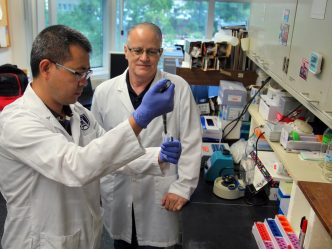Due to inclement weather in May, Strike Out Stroke Night at the Augusta GreenJackets game has been rescheduled for July 5.
AUGUSTA, Ga. – Every 40 seconds, someone in America has a stroke, and about every four minutes, stroke claims a life. Stroke kills more than 133,000 people a year, according to the American Heart Association/American Stroke Association. It’s the second leading global cause of death, behind heart disease.
“That’s why we want to education everyone on the signs and symptoms of stroke,” said Dr. Jeffrey Switzer, a stroke specialist and neurologist at Augusta University’s health system. “The sooner you recognize that someone is having a stroke, the sooner you can help them get emergency medical care. The quicker they receive help, the greater their chances of recovery from stroke.”
The warning signs of stroke come on fast, and that’s a great acronym to use for learning the signs – F.A.S.T. (face, arms, speech, time).
F – Face droopy?
A – Arm weakness
S – Speech difficulty
T – Time to call 911
“The window of opportunity to start treating stroke patients is three hours, but to be evaluated as to the most appropriate stroke treatment, patients need to get to the hospital within 60 minutes,” Switzer said. “Knowing stroke symptoms, calling 911 immediately, and getting to a hospital are the critical steps to follow.”
Augusta University Medical Center, located in the heart of the stroke belt, is the area’s only Joint Commission-certified Advanced Comprehensive Stroke Center. Patients in rural Georgia hospitals have fast access to quality stroke care at AU Medical Center and through REACH Health, Inc., a telemedicine program pioneered at Augusta University’s Medical College of Georgia that allows neurologists to diagnose and treat stroke patients remotely.
“Like a heart attack, a stroke is serious,” Switzer warns, “because it causes more long-term disabilities than any other disease.”
A stroke is sometimes called a brain attack, because it is typically triggered by a clot that blocks blood flow to the brain. The brain cells in the immediate area begin to die because they stop getting the oxygen and nutrients they need to function. Stroke is also the leading cause of serious long-term disability in the U.S. because damage in the brain can affect the entire body and its functions.
 Augusta University
Augusta University




